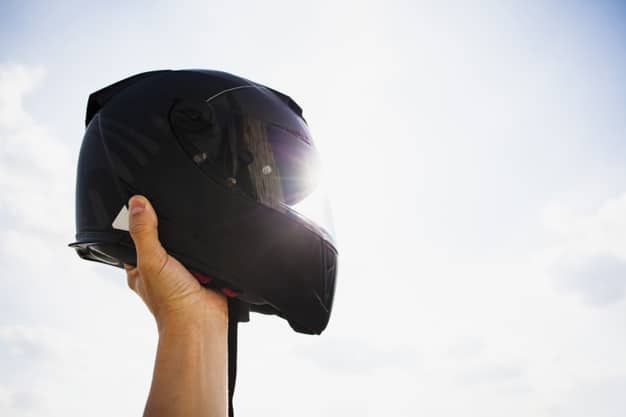If you’re a motorcycle rider in California, wearing a helmet might be second nature. Still, you can’t help but ask, “How effective are motorcycle helmets?”
Do you need to wear a safety helmet when you get on your bike? Will it save your life? Lets’ dig into this topic, so you’ll understand why so many people wear helmets.
First, though, let’s look at the motorcycle law in California.
Are You Required to Wear a Motorcycle Helmet in California?
California has a universal motorcycle helmet law on the books. Riders and passengers alike must wear helmets, regardless of their age. Also, riders and passengers must make sure their helmets meet the government’s safety standards. Otherwise, they won’t be in compliance with the state helmet laws.
Do Motorcycle Helmets Really Save Lives?
Statistics show that motorcyclist fatalities are higher among unhelmeted motorcyclists than among helmeted motorcyclists. When you wear a helmet, your risk of suffering a fatal injury decreases by 37 percent. That turns into hundreds of lives saved each year. According to the NHTSA, helmets saved approximately 1,859 riders’ lives in 2016 alone.
Without a helmet, you have a higher chance of getting serious injuries in a motorcycle crash than a helmeted motorcyclist. The most common injuries are a neck injury or a head injury.
How Often Should Motorcycle Helmets Be Replaced?
According to the Motorcycle Safety Foundation, motorcycle helmets should be replaced every five years. However, you might need to replace your motorcycle helmet earlier if other circumstances apply.
If you wear your motorcycle helmet daily, you should replace it sooner due to the wear and tear. Also, replace your helmet before five years is up if it becomes loose, the interior or exterior begins to deteriorate, or if the lock or strap fails. Finally, if you’ve been in an accident, replace your helmet immediately. Your helmet might not be able to handle another motorcycle accident.

What Does DOT Stand for on Motorcycle Helmets?
The Department of Transportation, or DOT, sets the federal standards for motorcycle helmets. DOT-approved helmets have undergone rigorous testing to ensure they meet the federal government’s standards.
DOT’s performance testing includes the:
- Impact attenuation test
- Penetration test
- Retention system test
Helmets that pass the test are DOT certified, meaning they meet the standards set forth by the federal government and the state of California. If you want to be road-legal, you need to wear a DOT-approved helmet when you ride your motorcycle in this state.
How Do I Know If a Helmet is DOT Approved?
It’s easy to find out if your helmet is DOT approved. You will find a painted symbol or DOT sticker on the back of your helmet. This sticker or symbol indicates that the helmet has passed the DOT inspection.
If you ask yourself “What kind of motorcycle helmet should I get?” start with a DOT-approved helmet. Consider getting a full-face helmet as well to get the most protection possible. Then you will be much safer when you’re on the road.
Can I Remove the DOT Sticker From My Helmet?
Since you need to use a DOT approved helmet in California, it’s wise to keep the sticker on. While most police officers will not question if your helmet is DOT-approved and if it has a full-face shield, you don’t want to get in a situation where you have to prove that you’re complying with the law. It’s easier to keep the sticker on so the police can see if you’re pulled over or involved in an accident.

How Effective Are Motorcycle Helmets?
Even when you look at the data, you might have questions regarding motorcycle helmet effectiveness. Let’s look at some motorcycle helmet safety facts so you’ll understand the effectiveness of helmets.
First, the Government Accountability Office states that mandatory helmet law has been the only effective strategy in reducing motorcycle deaths. To prove this point, you just need to compare fatalities in states with and without helmet laws. States without a universal helmet law had 10 times more unhelmeted motorcycle deaths than states with helmet laws on the books.
Helmets also reduce the risk of traumatic brain injury and cervical spine injury. If you have a helmet on, you’re much less likely to suffer this life-changing and devastating injury.
It’s also worth noting that protective headgear has become more effective in recent years. New materials and designs have reduced the fatality rate dramatically. Currently, the best helmet type is a full face helmet with eye protection and a chin bar. Without a
Between 1982-1987, helmets reduced the chance of fatalities by 29 percent, but now, riders decrease their risk by more than a third by donning a motorcycle helmet. That’s a great reason to put on a motorcycle helmet when you ride your bike. It goes beyond complying with the law, although that’s very important. You will also be much safer.
Stay Safe on the Road
Bikes are fun to ride, but they can be dangerous. You can mitigate the risk by wearing a DOT-approved helmet when you’re on the road. Strap on your helmet and then take on the California roadways.
Don’t forget to replace your helmet regularly to stay safe. You’ll come to appreciate the extra level of protection.
Even when following all the safety rules motorcyclists still are under risk on the road. Accidents pose a higher danger to motorbike riders compared to car passengers. If you or your loved one are injured in a crash contact the best Los Angeles motorcycle accident attorneys to discuss your legal rights and whether it makes sense to move forward with filing a personal injury claim.
